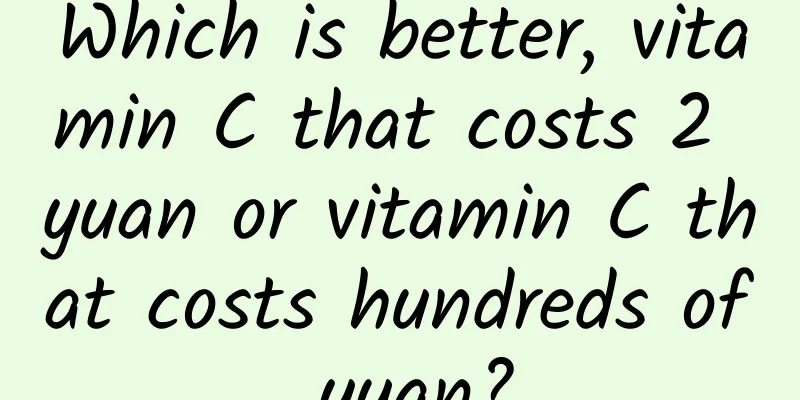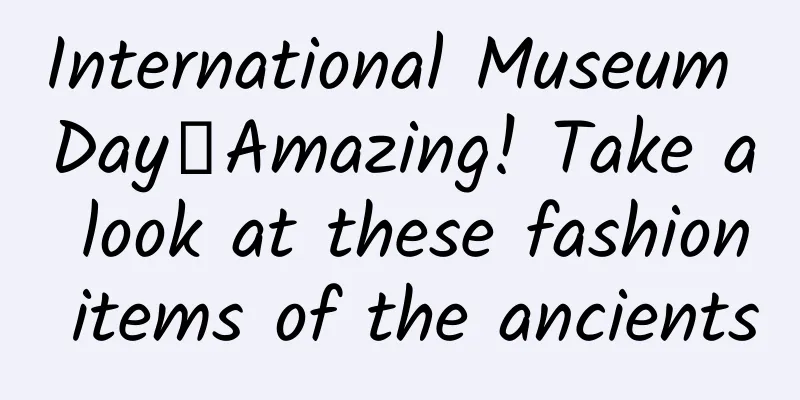Which is better, vitamin C that costs 2 yuan or vitamin C that costs hundreds of yuan?

|
Speaking of vitamin C, many people think it is a good thing. There are many foods around us that contain vitamin C, such as vitamin C drinks, candies, juices... Many businesses will emphasize the role of vitamin C, from fighting cardiovascular diseases to colds, oral ulcers, and even beauty and skin care, vitamin C can play an important role. In recent years, various vitamin C products have become the darlings of the market. However, here comes the question! What is the difference between the natural vitamin C that many merchants on the market strongly recommend, which costs hundreds of yuan per bottle, and the inconspicuous vitamin C that costs only a few yuan per bottle? Compared with synthetic vitamin C, is natural vitamin C really better? Let's clarify these questions one by one today! What does vitamin C do? Vitamin C is probably the vitamin we hear about most often, and many products also emphasize the importance of vitamin C. Vitamin C (Ascorbic Acid) is also called "ascorbic acid". It is an indispensable nutrient for the human body and is indeed very important for human health. Once the human body lacks vitamin C for a long time, it will cause scurvy, causing bleeding gums, tooth loss, skin problems, and even life-threatening in severe cases . Hundreds of years ago in the Age of Exploration, many sailors often died of a disease - scurvy after going out to sea. Later it was discovered that it was due to a lack of vitamin C, so vitamin C was called "ascorbic acid". Copyright images in the gallery. Reprinting and using them may lead to copyright disputes. Vitamin C is water-soluble. If we take in excess, it will be excreted from the body through our urine. Do we need vitamin C supplements? According to our survey data, the average daily vitamin C intake of Chinese residents aged 65 and above is 71.8 mg, with a median level of 59.5 mg/day; the average daily vitamin C intake of adults aged 18 to 35 is 56.41 mg/day. Our recommended daily intake is 100 mg/day . It can be seen that many of us still have the problem of insufficient intake of vitamin C, and the main reason is that we do not eat enough fruits and vegetables. A previous study in the Lancet said that one of the problems in our diet is that we do not eat enough fruits . Copyright images in the gallery. Reprinting and using them may lead to copyright disputes. Therefore, it is not harmful to take a moderate amount of vitamin C every day, and the benefits may even outweigh the disadvantages . After all, vitamin C is water-soluble, relatively safe, and cheap. Natural vs. synthetic, how big is the difference? There are many vitamin C products on the market, some cost two or three yuan a bottle, and some cost two or three hundred a bottle. Those costing two or three hundred a bottle usually claim to be natural and better. So, is there really a difference between natural vitamin C and synthetic vitamin C? Is natural vitamin C really better? In fact, from the perspective of vitamin C supplementation for the human body, there is no difference at all between natural vitamin C and artificially synthesized vitamin C. Copyright images in the gallery. Reprinting and using them may lead to copyright disputes. First of all, from a structural point of view, the chemical structure of natural vitamin C and synthetic vitamin C is exactly the same, the two are just different sources. Natural vitamins are vitamins extracted from food, and synthetic vitamins are vitamins with the same ingredients that are produced by artificial synthesis. Many people think that artificial synthesis requires various chemical reagents. In fact, extracting vitamin C from plants also requires various chemical reagents, and vitamin C is also a chemical substance. Our human body is also composed of various chemical substances, such as water, oxygen, carbon dioxide, etc. There is no need to panic about chemical substances, as they are everywhere and are also necessary for the human body. Secondly, in terms of function, natural vitamin C and synthetic vitamin C have exactly the same function . Vitamin C itself is a chemical substance, whether it is chemically synthesized, fermented or extracted from natural food, as long as the structure is the same, the function is exactly the same. In fact, the biggest difference between natural vitamin C and synthetic vitamin C is the price. Natural vitamin C is generally more expensive. However, I still want to remind everyone that vitamin C that costs 2 yuan a bottle is good enough, so don't waste your money . How to supplement vitamin C? 1. Eat more fresh fruits and vegetables Vegetables and fruits contain the most vitamin C. According to the dietary guidelines, you can get enough vitamin C by eating 500 grams of vegetables and 250 grams of fruits every day . For example, vegetables such as bell peppers, kale, pea sprouts, cauliflower, and fruits such as sour jujube, winter jujube, kiwi, hawthorn, and strawberries are rich in vitamin C. You may wish to eat more of them. Moreover, vegetables and fruits not only contain vitamin C, but also contain carotenoids, vitamin E, B vitamins, iron, zinc and other vitamins, minerals, dietary fiber and other nutrients that are beneficial to health. Many nutritional studies have found that eating more vegetables and fruits can reduce the risk of many chronic diseases such as cardiovascular disease and diabetes. 2. Take vitamin C supplements appropriately If you are worried that you are not getting enough vitamin C from eating fruits and vegetables, you can buy some vitamin C supplements. A bottle of vitamin C that costs two or three yuan is enough. If you don't have the conditions to eat vegetables and fruits on a regular basis, or don't eat enough, it is still good to take 100-200 mg of vitamin C supplements every day, but there is no need to take more . Moreover, there is actually no difference between natural vitamin C and synthetic vitamin C. If you want to supplement vitamin C, a bottle of vitamin C for two or three yuan is enough. 3. Supplement moderately, don't overdose It is worth noting that whether it is natural or synthetic vitamin C, the more you take, the better. Excessive intake is also not good for health. Adults can tolerate a maximum intake of 2,000 mg of vitamin C per day, but if you take such a large amount of vitamin C for a long time, it will increase the risk of urinary stones. So I suggest that you should also be careful not to exceed this amount when taking it. References [1] Sun Guiju, Yang Yuexin, Liu Liegang, et al. Scientific consensus on the use of nutrient supplements[J]. Acta Nutrimenta Sinica, 2018, 40(06): 521-525. DOI: 10.13325/j.cnki.acta.nutr.sin.2018.06.002. [2] Li Weiyi, Zhang Bing, Wang Huijun, Wang Zhihong, Wang Liusen, Wang Shaoshunzi, Hao Lixin, Jiang Hongru. Current status and changing trends of dietary vitamin intake among adults aged 18-35 years in 15 provinces (autonomous regions and municipalities) in China from 1989 to 2015[J]. Journal of Health Research, 2021, 50(03): 448-453. DOI: 10.19813/j.cnki.weishengyanjiu.2021.03.017. [3] Jia Xiaofang, Wang Zhihong, Zhang Bing, Su Chang, Du Wenwen, Zhang Jiguo, Jiang Hongru, Huang Feifei, Ouyang Yifei, Wang Yun, Li Li, Wang Huijun. Dietary vitamin C intake of residents aged 65 years and above in 15 provinces (autonomous regions and municipalities) of China in 2015[J]. Journal of Health Research, 2019, 48(01): 16-22. DOI: 10.19813/j.cnki.weishengyanjiu.2019.01.002 [4] Health effects of dietary risks in 195 countries,1990–2017: a systematic analysis for the Global Burden of Disease Study 2017. DOI: https://doi.org/10.1016/S0140-6736(19)30041-8. [5] Carr AC, Vissers MC. Synthetic or food-derived vitamin C--are they equally bioavailable? Nutrients. 2013 Oct 28;5(11):4284-304. doi: 10.3390/nu5114284. PMID: 24169506; PMCID: PMC3847730. [6]https://www.mcgill.ca/oss/article/health-you-asked/there-difference-between-synthetic-and-natural-vitamin-c [7] Dietary Guidelines for Chinese Residents 2022 Edition. Chinese Nutrition Society [8] Food and Health: Consensus of Scientific Evidence. Chinese Nutrition Society. Planning and production Author: Ruan Guangfeng, Deputy Director of Kexin Food and Health Information Exchange Center Review丨Zhong Kai, Director of Kexin Food and Health Information Exchange Center Planning丨Cui Yinghao Editor: Cui Yinghao |
Recommend
Xiaohongshu blogger fan training camp: one note to increase 10,000 fans and WeChat traffic skills
Xiaohongshu blogger fan training camp: one note t...
Want to achieve the "complete form" of intelligent driving? Cars, roads, and clouds must first "align granularity"
With the mature development of new energy intelli...
Why does this small northeastern city have 10 short track speed skating champions?
On February 5, Chinese short track speed skating ...
iOS Advanced - iOS Memory Management
1 It seems that everyone has considered the probl...
How to carry out brand promotion on Bilibili?
Bilibili is facing the new generation of young pe...
How to increase user growth? A complete system architecture for user growth!
In the world of the Internet , everything is for ...
Life is not easy! A 60-year-old courier sorter died suddenly in the early morning. You must know the truth about sudden death.
Recently, the topic of "60-year-old ZTO Expr...
What is server hosting?
What is server hosting? In general, server rental...
Has Pinduoduo reached a growth turning point?
For a long period of time, the e-commerce industr...
The Chinese ancestors that we are familiar with in textbooks actually looked like this!
On the morning of September 24, the Henan Provinc...
How to write World Cup copy? Here are some ready-made…
The World Cup is coming, how can copywriters scor...
Why is the anti-cancer drug so expensive at 1.2 million per injection?
This article was first published by Hunzhi (WeCha...
Can AI "copy" human smiles in advance? Is it possible for AI to integrate into the human social world?
The emergence of large language models (LLMs) suc...
Lanzhou hotel reservation mini program functional requirements, which hotel reservation mini program development company is best?
Nowadays, the hotel industry is no longer limited...









